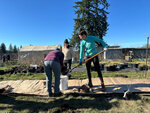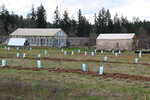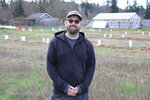


Taking on climate change isn’t too big of a challenge for Warren Neth, owner of Cosmic Carrot Farm in Yelm.
In 2020, he lobbied for the grant monies from the Washington State Sustainable Farm and Fields fund, and last month, he received approximately $8,000 to plant an alley-cropping system to grow berries with the highest levels of antioxidants.
Alley-cropping systems are an agroforestry practice in which rows of trees or shrubs are planted to create alleys in which agricultural or horticultural crops are produced, according to the U.S. Department of Agriculture. In Neth’s case, annuals like vegetables were planted between rows of perennials like berries.
The initiative supports local farmers across the state by providing them with funds to plant crops that reduce carbon, add biodiversity and help farms fight climate change.
“I’m a big advocate for alley-cropping systems. It’s something that is very applicable for this area,” Neth said of the agroforestry practice. “We need to really figure out how to reduce our food system’s burden on the environment, and this is one way to do that.”
Cosmic Carrot Farm planted 500 feet of elderberry, aronia and goumi berry in mid-February because of their high level of cancer-fighting antioxidants. Neth said he plans to use the berries in value-added products like gummies and teas. Between the rows of berries, the farm aims to grow vegetables and flowers that will be sold at its farm stand, the Yelm Farmers Market and to restaurants in the spring.
According to research from the U.S. Department of Agriculture, alley cropping can sequester an estimated 1.37 tonnes of carbon dioxide per acre per year, which is equivalent to the amount of gas it takes to drive 3,401 miles in a standard SUV. Alley cropping also reduces irrigation needs by lowering water evaporation in soils by 15% to 30% and reduces fertilizer needs, Neth said.
Cosmic Carrot Farm was one of four sites in the Thurston Conservation District to receive funding for the program. Dancing Goats and Singing Chickens Farm in Yelm, Helsing Junction Farm in Rochester and Oyster Bay Farm in Olympia also received funding.
Thurston Conservation District was awarded $52,798 by the Washington State Conservation Commission from the program to support education about both hedgerows and agroforestry practices.
Neth, along with Kiana Sinner and Jae Townsend from the Thurston Conservation District, planted the alley cropping system into Cosmic Carrot Farm, which spreads about 8 acres and is located at 12125 Blueberry Hill Lane SE in Yelm. The farm also hosted 25 people for an educational, hands-on workshop from the Thurston Conservation District and Washington State University Forrester Patrick Shults.
“We’re creating more of a human-scale food system here that takes a lot more human labor, so getting the village together to plant it in was awesome,” Neth said. “Climate change has always been pretty important for me. Since I grew up on a small farm in Ridgefield, I got engaged in more local food-system activism at a pretty early age.”
Neth said that it means a lot to him to have a platform to help fight climate change, no matter the scale. He added that farmers must be aware of how climate change affects not only farms but the food industry as a whole.
“We’ve recognized that climate change is here, and it’s really affecting us. While we can do things to mitigate it, we really need to create systems that will not be completely wiped out by the extreme heat or extreme cold events, flooding, intense precipitation and intense periods of drought,” Neth said.
Cosmic Carrot Farm will host two spring markets at the farm on Sunday, April 28 and Sunday, May 26, where visitors tour the farm and learn more about alley cropping. The farm will offer plant starts to help visitors begin their own backyard gardens, flower bouquets or kid activities. To reserve a spot for a tour, visit https://www.cosmiccarrotfarm.com/.
Local farms that are interested in receiving funding for similar practices can visit the Sustainable Farms & Fields fund website at https://www.scc.wa.gov/programs/sustainable-farms-fields.
Applications for the next round of funding are due by 5 p.m., Wednesday, March 20, to be considered for review.